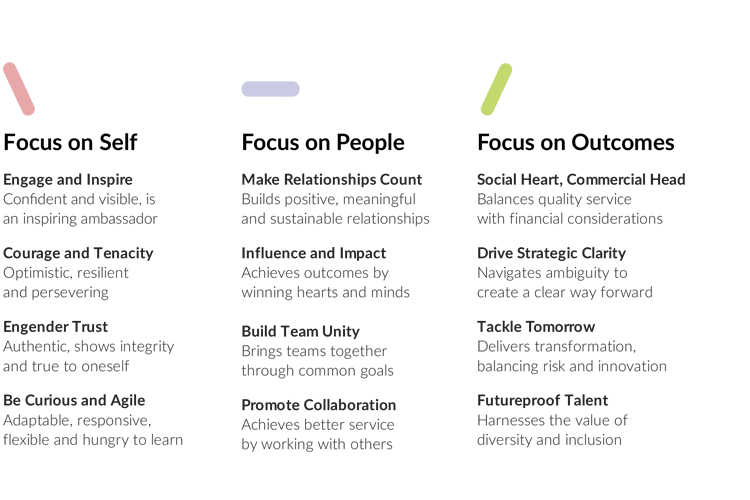Our research has found that the most significant people issue for our Housing and Public Sector clients is the development of their senior leaders, which has been further highlighted through the impact of the pandemic on working practices and expectations.
Gartner research confirms this, with ‘current and future leadership bench strength’ as a top 5 people priority in 2021, with 44% of HR representatives reporting that they are struggling to develop their senior leaders.
The challenges leaders face in the Housing sector
Our conversations with leaders in your sector have shone a spotlight on many challenges. There are, however, three that consistently arise in our interactions with Chief Executives and Board members:
- Transforming Services to meet Future Demand
- Responding to and Influencing Policy
- Diversity and Inclusion.
For each challenge we reference the critical leadership behaviours and then use benchmarking data from GatenbySanderson leadership profiling to provide insights into the capacity of leaders in your sector to deliver on these.
Defining behavioural excellence
In this article we will reference the GatenbySanderson leadership model, Altitude, this describes behavioural excellence for leaders working across the Public, Education and Not for Profit Sectors. The model includes 12 behaviours falling into three clusters; Focus on Self, Focus on People and Focus on Outcomes.
We have mapped assessment data on over 3,500 leaders to these behaviours allowing us to benchmark and compare leader capability in different sectors to the broader Public Sector (we have data for over 220 leaders from the Housing sector). We calculate this variance to generate a Net Leadership Capability score that can then be reported as a ‘strength’ or a ‘risk’.

While all 12 of these behaviours are key to leadership success, some of these are of particular relevance to the immediate challenges identified for housing associations, and insight for these is referenced below.
The leadership behaviours that matter in your context
Transforming Services to meet Future Demand: The Covid-19 crisis has caused further shifts in the ways that services are being delivered to housing association customers. The changing demands of customers and the financial environment which housing associations operate in requires service transformation to deliver value for money. Services are therefore required to be shaped around these changing needs; advancements in technology have played an increasingly important role in enhancing service delivery to customers.
There is an ongoing focus on the need to tackle the under-supply of housing in the UK, with 345,000 homes needed each year, accounting for new household formation and a backlog of existing need for suitable housing. Within the sector there is a general consensus for the need to tackle this as a priority, but less agreement on how best to achieve the necessary increase in supply.
‘Outcomes’ behaviours are key to delivering on this challenge with ‘Social Heart, Commercial Head’ and ‘Tackle Tomorrow’ of particular relevance. Both areas support the need for housing leaders to balance financial requirements with customer service, and to understand future demand and how best to deliver upon it.
The Net Leadership Capability shows that Housing leaders demonstrate a significant strength in balancing excellence in delivery to customer with financial constraints compared to the wider public sector. On the other behaviour related to this challenge, ‘Tackle Tomorrow’, they show a similar profile to the wider public sector. The data indicates the positive potential for leaders in the housing sector to show the commercial acumen needed to deliver transformed services, whilst needing to focus on the capability to balance future risk and innovation.
Responding to and Influencing Policy: On a national scale the housing sector has seen several key policy changes which intend to deliver improvement in transparency and accountability. The Social Housing White Paper was published in November 2020 and at the heart of the white paper is the Charter for Social Housing Residents which sets out seven commitments that residents should expect from their landlord, alongside a range of other measures and reforms.
Other key national policy areas influencing the sector include the high-profile Grenfell Tower Inquiry and necessary increased focus on building safety; the government’s commitment to be zero carbon by 2050 and increased consumer standards amongst others. On a more local level it is increasingly important for housing leaders to build collaborative approaches with key stakeholders such as local councils around aspects such as planning, development and regeneration.
There are therefore various policies influencing the way that housing associations operate, and it is important that leaders are aware of them, how they will affect their organisation, and how to respond. Housing leaders will need to develop political awareness and to positively influence key sector decisions at a macro and micro level.
The behaviour of ‘Influence and Impact’ is of particular importance for leaders in relation to this challenge and their ability to achieve outcomes by winning hearts and minds. Our data suggests they show a similar potential to the wider public sector on Influence and Impact, the behaviour likely to drive their capability to proactively influence policy. Other behaviours such as ‘Making Relationships Count’ and ‘Promoting Collaboration’ will also play an important role and for both of these factors our data shows them to be significant development areas for Housing Leaders when compared to the public sector baseline. This indicates that enhancing the capability of leaders to both influence and work effectively with others across the system will therefore be key if Housing Associations are to rise to these challenges and make their voices heard at a local and national level.
Diversity and Inclusion: Our conversations with Boards and their leadership teams frequently reference the need for housing associations and their leadership teams to be more representative of the communities they serve. The National Housing Federation’s EDI report in 2020 stated that their review “reveals multiple challenges around understanding diversity, equality and inclusion in the sector, as well as benefits in acting, but the starting point is data. We need to know where we are in order to know where we want to be and measure progress”.
The Behaviour of focus here is ‘Futureproof Talent’; here the Net Leadership Capability score shows that leaders in the housing sector, when compared to the broader Public Sector, have greater potential to deliver on this behaviour with a significant, positive difference in their score. Whilst this suggests a potential strength for leaders in the sector, as they look to address diversity and inclusion in their organisations, we also recommend caution with the need to consider diversity in its broadest sense, including leveraging the lived experience of individuals and that beneficiaries have a voice when shaping strategy and determining priorities.
Working in partnership with you
Our Leadership & Talent Consultancy is a team of talent, leadership and organisational development specialists dedicated to helping our clients tackle the leadership challenges that matter to them and ultimately deliver on our mission to ‘find and develop leaders to shape a better society’.
Our solutions include succession management, executive coaching, top team development, leadership development programmes, organisational development and board evaluation. Some of our recent work in the Housing sector includes:
– Executive Leadership Succession Programme for Gentoo Housing to support their transformation programme. There was a requirement to develop leadership capability to work beyond the immediate traditional internal and external boundaries to break down silos and engage with the wider system in the North East. A key part of this was to re-engage the extended leadership population to equip them with the enhanced level of leadership skills required for the next stage of their strategic plan. GS designed and delivered a tailored personal development experience which aimed at providing stretching development feedback, exploring what cultural transformation would mean for them and their teams, whilst benchmarking current performance levels against the group’s newly defined leadership competency framework. We also provided ongoing coaching support to support the embedding of these behaviours.
– Board Review and development for Broadacres Housing Association. With the arrival of new board members and the need to improve their rating with the housing regulator Broadacres commissioned GS to carry out an external review of how well the collective group worked together, receive feedback on their performance and to support the board in their development journey. This involved several approaches such as live board observations, role conversations, one-to-one feedback sessions and board workshops. The successful programme enabled the board to work more effectively as a group and they have since improved their rating from G2 V3 rating to G1 V1.
– Delivering the Leadership NOW! Programme in partnership with the UNIFY Bame Network. In November 2020 we launched the programme to help accelerate leadership diversity in housing. The first cohort has seen over 40 participants from ethnically diverse backgrounds involved in a series of bespoke initiatives, workshops, leadership development profiling and coaching to accelerate personal learning. The programme focuses on 2 key areas: career progression and leadership development and has already seen several promotions following support from the programme along with personal development. We believe the programme will play an important role in enabling diverse leadership talent in the sector.
– Leadership Competency Framework & Leadership Development for a Housing Association. They were looking to develop a new leadership competency framework and embed the behaviours through a leadership development programme. The programme involved the design of a new competency framework, a diagnostic survey to measure against new behavioural competencies, a series of workshops and executive coaching.
We have extensive experience supporting organisations and individuals understand their leadership capability and developing their top teams to be future ready. If you’d like to discuss how we can support your organisation with your leadership challenges, please contact Phil Whitman at
phil.whitman@www.gatenbysanderson.com.
